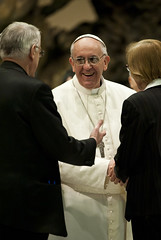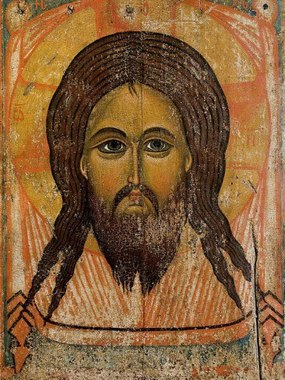
Recently in Faith & the Public Order Category

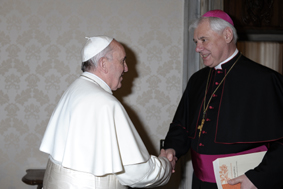 The Pope is meeting with all the heads of the various departments of the Holy See.
The Pope is meeting with all the heads of the various departments of the Holy See. Speaking in French today, Pope Francis gave his talk in Italian outlined to the world's diplomats the mission of his pontificate: building peace AND constructing bridges of dialogue, combatting spiritual AND material poverty. This is part 2 of his "pontifical program of ministry." The Pontiff met the more than 180 accredited diplomats in Sala Regia of the Apostolic Palace, the Vatican.

World map of the Vatican foreign relations; dark green: diplomatic relations, light green: other relations, gray: no official relations (credit: Wikipedia)
Your presence here in such numbers is a sign that the relations between your countries and the Holy See are fruitful, that they are truly a source of benefit to mankind. That, indeed, is what matters to the Holy See: the good of every person upon this earth! And it is with this understanding that the Bishop of Rome embarks upon his ministry, in the knowledge that he can count on the friendship and affection of the countries you represent, and in the certainty that you share this objective. At the same time, I hope that it will also be an opportunity to begin a journey with those few countries that do not yet have diplomatic relations with the Holy See, some of which were present at the Mass for the beginning of my ministry, or sent messages as a sign of their closeness - for which I am truly grateful.
Be sure to have enough sleep and at least have eaten one meal today before you read and give some serious consideration to what Father George Rutler, pastor of the Church of Our Saviour (NYC) has to say about the death penalty. A recent essay was published today in Crisis Magazine online.
MOST Catholics, the informed and untrained, have no idea what the Church teaches about the subject. Many will recall that Pope John Paul II taught in Evangelium vitae (1995) and that he frequently spoke against the death penalty and it was the subject of intervention when he would visit a country where the death penalty was utilized (think of his visit to Missouri). A papal encyclical doesn't change the teaching of the Church; it is however authoritative and it needs to be received. The matter of what level teaching an encyclical is, and to what degree it would bind conscience. For our purposes here, let's say that a papal encyclical is authoritative and it involves the virtue of prudence but that it doesn't contravene but it does nuance the teaching of the Church. Prudential judgment is just that, prudential. The Pope never changed the teaching of the Church. The blessed pope did try to reorient our thinking and the practice of killing legitimately convicted criminals. Remember, too, several years the heated debated between Cardinal Avery Dulles and Justice Scalia on the subject in First Things?
Father Rutler's article is helpful in giving us yet another understanding of how we might understand the death penalty. Do we actually accept Christian belief in the salvation of one's soul, that is, do we want to go to heaven? Read the article with openness, with a critical mind. As Saint Ignatius would teach, approach with the best of intentions to truly understand the other person. Knee jerk reactions are unacceptable for a Catholic who holds the integration of faith and reason. Father Rutler's argument is Catholic on all levels.
The article...
Capital punishment does not inspire roaring humor in healthy minds, so wit on the subject tends to be sardonic. Two of the most famous examples, of course, are: "In this country it is wise to kill an admiral from time to time to encourage the others," and "Depend upon it, sir, when a man knows he is to be hanged in a fortnight, it concentrates his mind wonderfully."
The first, "pour encourager les autres," is in "Candide" where Voltaire alludes to the death by firing squad of Admiral John Byng in 1757 for having let Mincorca fall to the French. The second was Samuel Johnson's response to the hanging of an Anglican clergyman and royal chaplain William Dodd for a loan scam. Byng's death was the last instance of shooting an officer for incompetence, while Dodd's was the last hanging at Tyburn for forgery. Dodd's unsuccessful appeal for clemency was ghostwritten by Dr. Johnson.
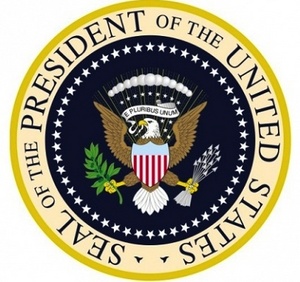
We pray, Thee O Almighty and Eternal God! Who through Jesus Christ hast revealed Thy glory to all nations, to preserve the works of Thy mercy, that Thy Church, being spread through the whole world, may continue with unchanging faith in the confession of Thy Name.
We pray Thee, who alone art good and holy, to endow with heavenly knowledge, sincere zeal, and sanctity of life, our chief bishop, Pope Benedict, XVI, the Vicar of Our Lord Jesus Christ, in the government of his Church; our own bishop, Donald, all other bishops, prelates, and pastors of the Church; and especially those who are appointed to exercise amongst us the functions of the holy ministry, and conduct Thy people into the ways of salvation.
We pray Thee O God of might, wisdom, and justice! Through whom authority is rightly administered, laws are enacted, and judgment decreed, assist with Thy Holy Spirit of counsel and fortitude the President of these United States, that his administration may be conducted in righteousness, and be eminently useful to Thy people over whom he presides; by encouraging due respect for virtue and religion; by a faithful execution of the laws in justice and mercy; and by restraining vice and immorality. Let the light of Thy divine wisdom direct the deliberations of Congress, and shine forth in all the proceedings and laws framed for our rule and government, so that they may tend to the preservation of peace, the promotion of national happiness, the increase of industry, sobriety, and useful knowledge; and may perpetuate to us the blessing of equal liberty.

The 113th United States Congress was sworn into office today.
Our prayers ought to be with them,
O God, who arrange all things in wondrous order and govern in marvelous ways, look with favor on the assembled, for whom we now pray, and mercifully pour out upon them the spirit of your wisdom, that they may decide everything for the well-being and peace of all and may never turn aside from your will.
By the numbers: 13 new senators, 84 new congress people. This freshman class has a Kennedy, a reindeer farmer and animal vet; 2 physicists in Congress. The longest in office, 38 years, is Senator Patrick Leahy of Vermont.
Catholics are
concerned for the common good, the good working of the public order.
Locking school doors will not keep Satan out if our hearts are open to him. Nor will banning weapons ban murder if God is banned from the conscience. Cain slew Abel without a gun. An illogical world can be saved from self-destruction only by loving the Logos who was in the Beginning, who was with God and was God.
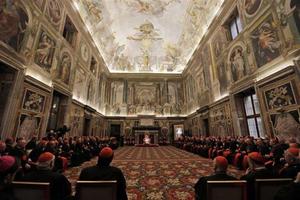
Pope Benedict gave his annual address, a "State of the Church," if you will, to the curial officials of the Holy See today.
You might say the content talk is crucially relevant for the work of the Church and the proclamation of the Gospel as he reviews key events and focuses on some themes. Among many things which need our attention and reflection, the Pope spoke about nature of man, family life, and inter-religious dialogue. Regarding man in which he gave insight into, he speaks of how evil and destructive vague and ideological the "gender conscious crowd" is to the nature of the person and removes God from conversation. Read the full text here.
The Pope notes the crisis of the family and its effect on society, caused by the unwillingness to make a commitment and by unwillingness to suffer. But he goes beyond the symptoms to diagnose the cause of the crisis. This talk is not an attack, it is an appeal to truth.
Each of Pope Benedict's addresses to the Roman Curia are important, certainly the 2005 address stands out, but today's will be memorable.
Here's a section:
First of all there is the question of the human capacity to make a commitment or to avoid commitment. Can one bind oneself for a lifetime? Does this correspond to man's nature? Does it not contradict his freedom and the scope of his self-realization? Does man become himself by living for himself alone and only entering into relationships with others when he can break them off again at any time? Is lifelong commitment antithetical to freedom? Is commitment also worth suffering for? Man's refusal to make any commitment - which is becoming increasingly widespread as a result of a false understanding of freedom and self-realization as well as the desire to escape suffering - means that man remains closed in on himself and keeps his 'I' ultimately for himself, without really rising above it. Yet only in self-giving does man find himself, and only by opening himself to the other, to others, to children, to the family, only by letting himself be changed through suffering, does he discover the breadth of his humanity. When such commitment is repudiated, the key figures of human existence likewise vanish: father, mother, child - essential elements of the experience of being human are lost".
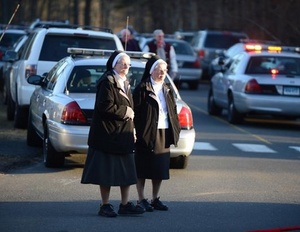 In the days following the Newtown tragedy many people are applying the concept of hero to those who lived and died with dignity offering themselves for the good of others. The adults at the Sandy Hook School can certainly be labeled as a heros. We can also bestow the title of hero on those who responded: police and fire personnel, healthcare professionals and social workers, and members of the clergy and consecrated religious.
In the days following the Newtown tragedy many people are applying the concept of hero to those who lived and died with dignity offering themselves for the good of others. The adults at the Sandy Hook School can certainly be labeled as a heros. We can also bestow the title of hero on those who responded: police and fire personnel, healthcare professionals and social workers, and members of the clergy and consecrated religious. 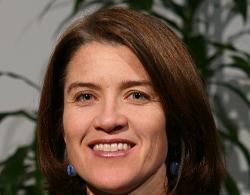 Alexia Kelly is the new president of a prominent Catholic fundraising office in Dupont Circle, Washington, DC.
Alexia Kelly is the new president of a prominent Catholic fundraising office in Dupont Circle, Washington, DC. 

